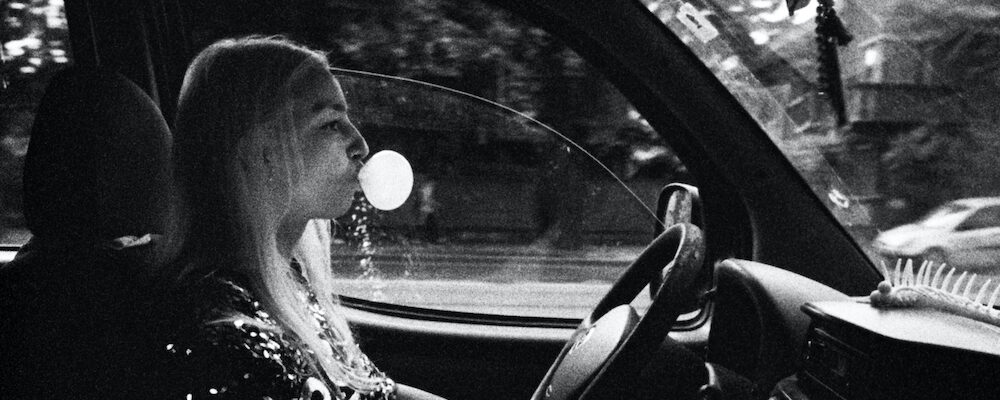‘Do Not Expect Too Much from the End of the World’: Radu Jude’s Scathing Slice of Satire Saves the Apocalypse for a Rainy Day
Tony Sokol
Writer-director Radu Jude’s “Do Not Expect Too Much from the End of the World” is a brilliantly caustic, subversive critique on the society that labor has made of Romania’s citizenry. This is not only because Uwe Boll puts in a cameo as a director who posts YouTube clips of the critics he’s beaten “the shit out of.” Someone has to stand up to bullies, and Jude does it from the passenger seat of an overworked, underpaid, foul-mouthed and hysterical driver who keeps falling asleep at the wheel.
Angela (Ilinca Manolache) is a production assistant for a film company who is kept on the road, traversing Bucharest to audition industrial accident victims for a corporate safety promotional film. She occasionally stops to post Instagram and TikTok clips as “Bobita,” using a bald head, bushy eyebrowed, stubbled chin filter, to deliver an unfiltered sexist takes on worldly events. While her misogynistic male alter ego may have the same forehead, eyebrow, and Dostoyevskian gaze as Father Arsenie Boca, Angela is no saint. She is, however, a martyr condemned to continue life as lives crumble around her. This isn’t the apocalypse. It’s another day on the job.
“Respect the rules or else you are fucked,” the prospective director of the corporate educational video pitches to Doris Goethe (Nina Hoss), the executive of the Austrian multinational corporation producing it. This captures the focus of the safety film: blaming workers for on-the-job injuries. A Zoom meeting puts soft golden lenses over the realities of industrial injury with closeups standing in for emotion. During an initially bonding scene with Angela, the efficiently frosty Ms. Goethe admits her great-great-great-grandfather was the famous writer, but under questioning she’s not even sure if she’s read “Faust.” It’s a family thing. This detail underscores the distance between bosses and those who do the work.
“Do Not Expect Too Much from the End of the World” is a road film because so much of the action occurs in motion. The cacophony of Bucharest’s insanely erratic traffic battles play well against the extraordinary soundtrack Angela blasts to keep out the constant barrage of horns, sirens, and unsubtle gestures endured as a dissonant counterpoint. What the music doesn’t drown out, Angela blows out with each bubble she pops from the gum she chews. It’s better than Mentos. Trade it some time, Ovidiu (Ovidiu Pîrșan) the newly chosen and very anticipatory workers’ safety film spokesperson, offers on his way to filming his side of the story. He was consigned to a wheelchair after suffering a head injury that left him in a coma, only to wake up paralyzed and ridden with bed sores. Protective helmets are more than a company rule, they are a symbol for the false security of a living wage.
Initially distracting, inserted footage from Lucian Bratu’s 1981 Romanian film “Angela Moves On” becomes a historical and emotional journey to many of the routes Angela travels. Anecdotes about Romanian dictator Nicolae Ceaușescu’s palatial and foreboding central government building are followed by the route through early 1980s neighborhoods ripped apart to make way for it. In the black-and-white telling of the current events, Manolache’s Angela describes a stretch of road which is a virtual highway to vehicular homicide, littered with the crosses erected for dead motorists. It is followed by a long montage of these altars, which appears to be taken from the grainier film stock of “Angela Moves On.” The cab-driving title character in the film-within-a-film is played by Dorina Lazar. Her Angela hitches a ride as a pensioner, showing what a short move Romanians have made to “Do Not Expect Too Much from the End of the World.”
Armageddon is only vaguely referenced in Angela’s story about a Danish porno film crew whose star couldn’t get it up during shooting. It comes as a visual representation in the way the worker who was injured is treated when filming the final segment which comprises the last act of the film. Shot with cinema verité veracity in a long single take, it is a satiric tour de force as every shred of random evidentiary evidence is removed to beautify the shot. Even the lone camera capturing the fleecing of the worker Ovidiu invests in his humiliation as the broken man must shift his wheelchair to the unflinching whimsy of its unwavering gaze.
The entire final act is a jolt, breaking the flow, style, and rhythm, forcing the viewer to take sides just as the filmmakers making the promotional piece are wondering just how much of their souls they lost contributing to the company which hired them. It is not apparent whether the film crew leaves Ovidiu stranded in the rain as well as deeper in the legal action against the multinational corporation who extorted his testimony.
Radu Jude, whose last movie was the erotically charged satire “Bad Luck Banging or Loony Porn” is a master of provocation, and “Do Not Expect Too Much from the End of the World” is an invitation to a fight. Furious, crude, and woundingly funny, the film never holds back, ravaging executive demand, sanitized public relations, road-rage, gig culture, racism, stupidity, corruption, and the Romanian forests. The running time of two hours and 43 minutes symbolizes the 16-to-20-hour day Angela works. The unrelenting detail of the final sequence makes it real.
“Do Not Expect Too Much from the End of the World” releases March 22 in select theaters.

